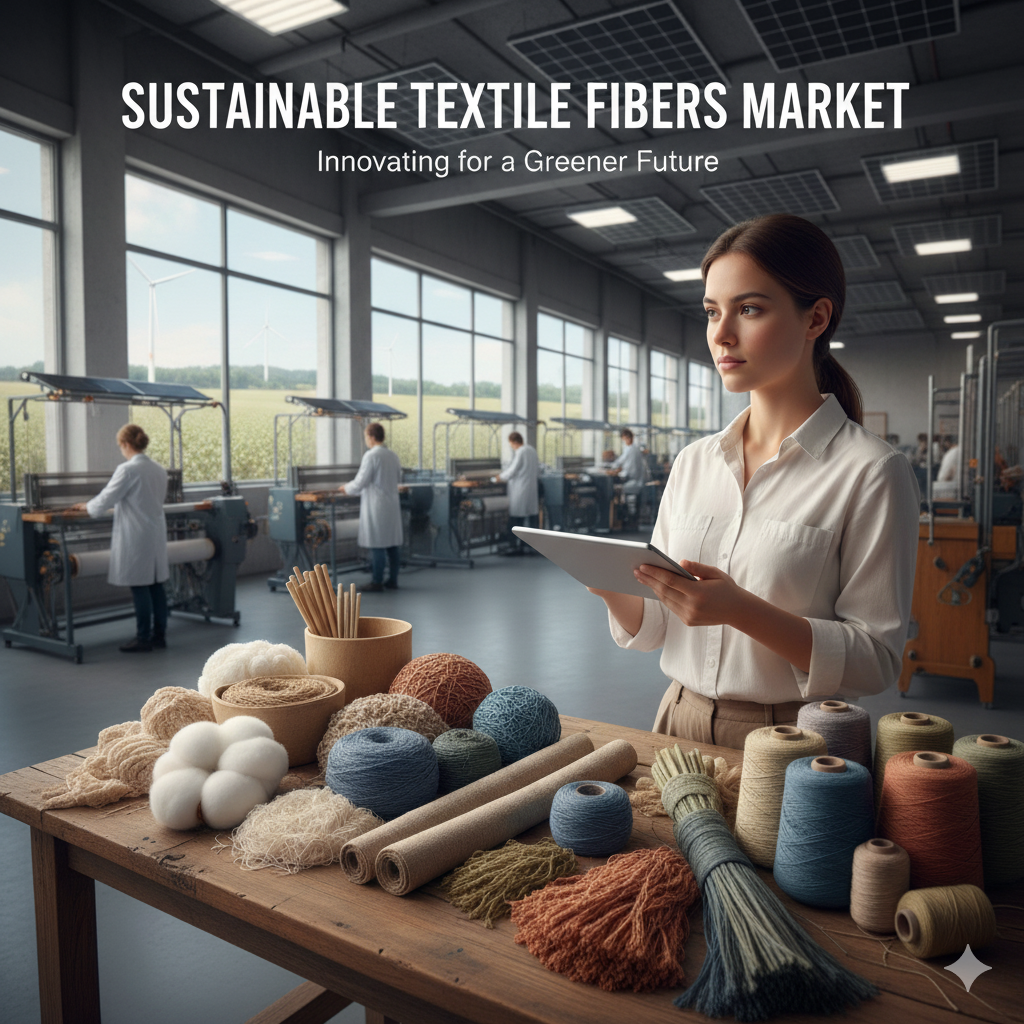-
Feed de notícias
- ECOSYSTEM
- EXPLORAR
-
Páginas
-
Grupos
-
Eventos
-
Blogs
Future of Fashion: The Expanding Sustainable Textile Fibers Market

The global Sustainable Textile Fibers Market was valued at US $48.15 billion in 2023 and is projected to reach US $71.65 billion by 2031, growing at a CAGR of 5.09% during 2024–2031. The market is experiencing strong growth driven by rising environmental awareness, stringent sustainability regulations, and the global shift toward circular fashion and eco-friendly materials.
Sustainable textile fibers — including organic cotton, recycled polyester, lyocell, hemp, and bamboo — are increasingly replacing conventional fibers in apparel, home textiles, and industrial fabrics. These fibers reduce environmental impact through lower water usage, reduced carbon emissions, and minimal chemical processing.
Leading fashion brands and textile manufacturers are investing in bio-based materials, recycling technologies, and closed-loop production systems to align with global sustainability goals and meet consumer demand for ethical products.
📌 Download Your Sample Report Instantly (Corporate Email ID required for priority access):
https://www.datamintelligence.com/download-sample/sustainable-textile-fibers-market
Key Demand Drivers
The demand for sustainable textile fibers is being fueled by the growing consumer preference for eco-friendly apparel, brand commitments to carbon neutrality, and regulatory pressure to reduce textile waste.
Governments and organizations are implementing circular economy frameworks and green certifications (e.g., GOTS, OEKO-TEX, and Bluesign), which are accelerating adoption.
Additionally, the fast fashion industry’s environmental footprint is prompting a shift toward biodegradable and recyclable fibers, while advances in fiber regeneration, chemical recycling, and alternative raw materials (like agricultural waste and algae-based fibers) are reshaping the market landscape.
Market Drivers
-
Sustainability Regulations: Global policies promoting eco-friendly and low-impact materials.
-
Consumer Awareness: Rising demand for ethical and sustainable fashion.
-
Corporate Commitments: Leading brands adopting sustainability goals and supply chain transparency.
-
Innovation in Fiber Production: Growth of recycled, bio-based, and regenerative materials.
-
Circular Economy Initiatives: Increasing textile recycling and waste reduction programs.
Market Segmentation
-
By Fiber Type: Organic cotton, recycled polyester, hemp, bamboo, lyocell, wool, and others. Recycled polyester and organic cotton currently hold the largest shares due to scalability and familiarity.
-
By Source: Natural fibers, regenerated fibers, and synthetic recycled fibers.
-
By Application: Apparel, home textiles, industrial fabrics, and others. Apparel dominates due to high consumer visibility and sustainability branding.
-
By Process: Mechanical recycling, chemical recycling, bio-based synthesis.
-
By Region: North America and Europe lead in sustainable production, while Asia-Pacific is emerging as a major manufacturing hub adopting green technologies.
Key Observations
-
Recycled polyester and organic cotton remain the most widely used sustainable fibers.
-
Rapid innovation in bio-based fibers and fiber-to-fiber recycling technologies.
-
Strong participation from fashion brands in circular economy programs.
-
Growing certification and traceability requirements across the textile supply chain.
-
Asia-Pacific evolving into a key region for sustainable fiber manufacturing and exports.
Geographic Insights
-
North America: Driven by sustainability initiatives from leading brands and strong adoption of eco-certifications.
-
Europe: Largest market due to stringent EU sustainability regulations and leadership in circular textile technologies.
-
Asia-Pacific: Fastest-growing region; manufacturers in China, India, and Bangladesh increasingly adopting green materials.
-
Middle East & Africa: Emerging potential with rising textile exports and eco-friendly fiber projects.
-
Latin America: Growth in organic cotton production and sustainable textile sourcing initiatives.
Key Players
-
Lenzing AG
-
Teijin Limited
-
Unifi, Inc. (REPREVE)
-
Birla Cellulose (Aditya Birla Group)
-
DuPont de Nemours, Inc.
-
Indorama Ventures Public Co. Ltd.
-
Eastman Chemical Company
-
Sateri Holdings Limited
-
Tencel™
-
Hyosung TNC Corporation
Latest Developments & Trends
-
Increasing investment in fiber recycling infrastructure and circular design technologies.
-
Rising popularity of biodegradable synthetic fibers and algae-based textiles.
-
Expansion of eco-labeling and transparency platforms (blockchain traceability).
-
Collaborations between fashion brands and textile innovators for sustainable sourcing.
-
Advances in chemical recycling of polyester and cellulose fibers.
Challenges & Restraints
-
High Production Costs: Sustainable fibers often more expensive than conventional ones.
-
Supply Chain Complexity: Limited raw material availability and certification barriers.
-
Performance Trade-offs: Some eco-fibers have lower durability or processing efficiency.
-
Consumer Price Sensitivity: Premium pricing limits mass adoption.
-
Standardization Issues: Lack of global uniform standards for sustainability claims.
Strategic Outlook & Recommendations
The Sustainable Textile Fibers Market is positioned for long-term growth as environmental responsibility becomes central to the textile industry. To maintain competitiveness, manufacturers should focus on cost reduction through technological innovation, waste valorization, and collaboration with apparel brands.
Investment in closed-loop systems, fiber traceability technologies, and next-gen bio-based materials will be key to scaling production sustainably. Additionally, improving consumer education and implementing recycling incentives will enhance market adoption.
Conclusion
The Sustainable Textile Fibers Market is reshaping the global textile industry by aligning profitability with environmental stewardship. Despite challenges such as cost and standardization, ongoing technological progress and policy support are propelling the transition to greener materials. As circular economy principles gain traction, sustainable fibers will become the cornerstone of responsible manufacturing and conscious consumerism worldwide.
Contact Us:
Company Name: DataM Intelligence 4market Research LLP
Contact Person: Sai Kiran
Email: Sai.k@datamintelligence.com
Phone: +1 877 441 4866
Website: https://www.datamintelligence.com
- Art
- Causes
- Crafts
- Dance
- Drinks
- Film
- Fitness
- Food
- Jogos
- Gardening
- Health
- Início
- Literature
- Music
- Networking
- Outro
- Party
- Religion
- Shopping
- Sports
- Theater
- Wellness


